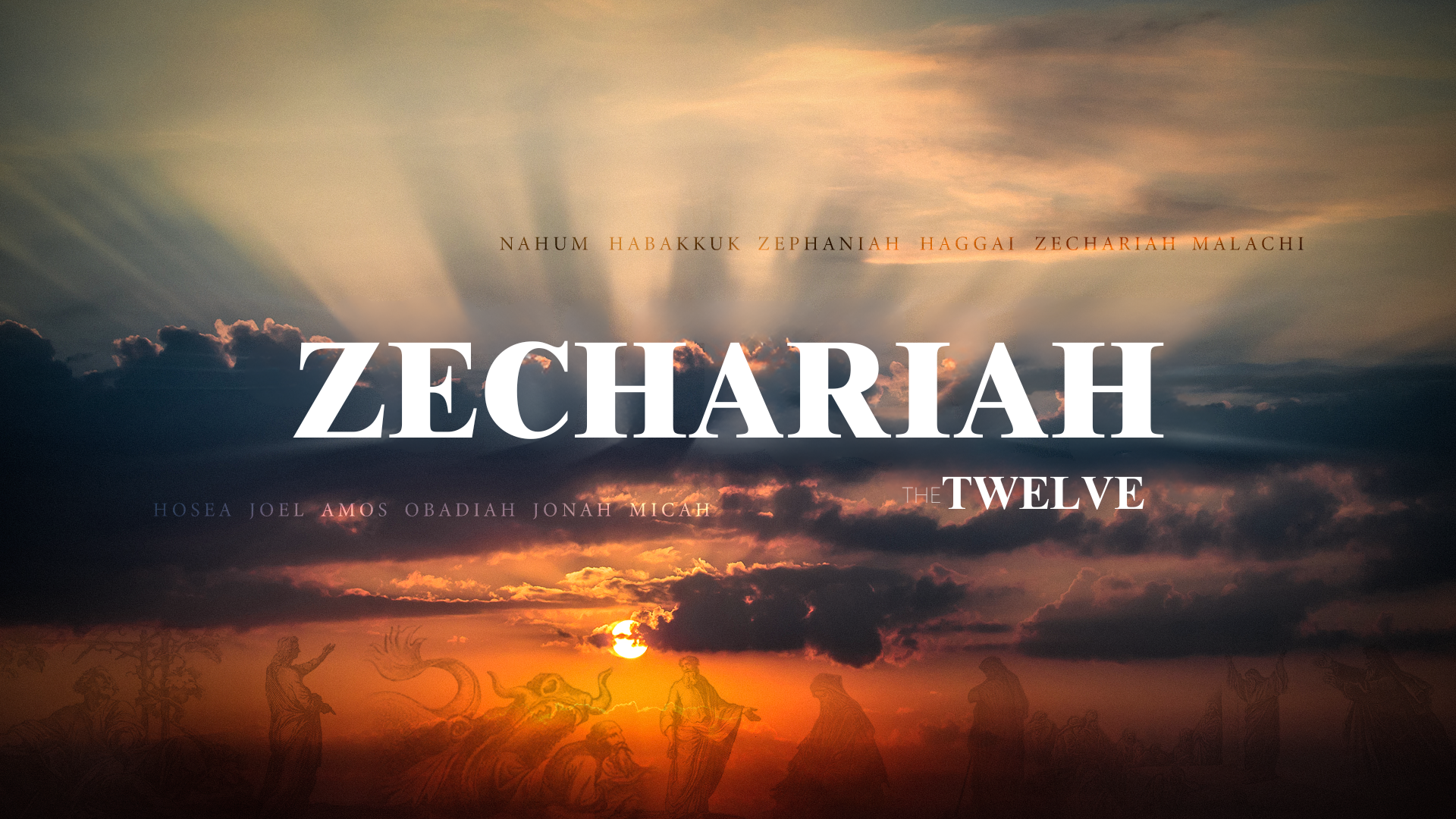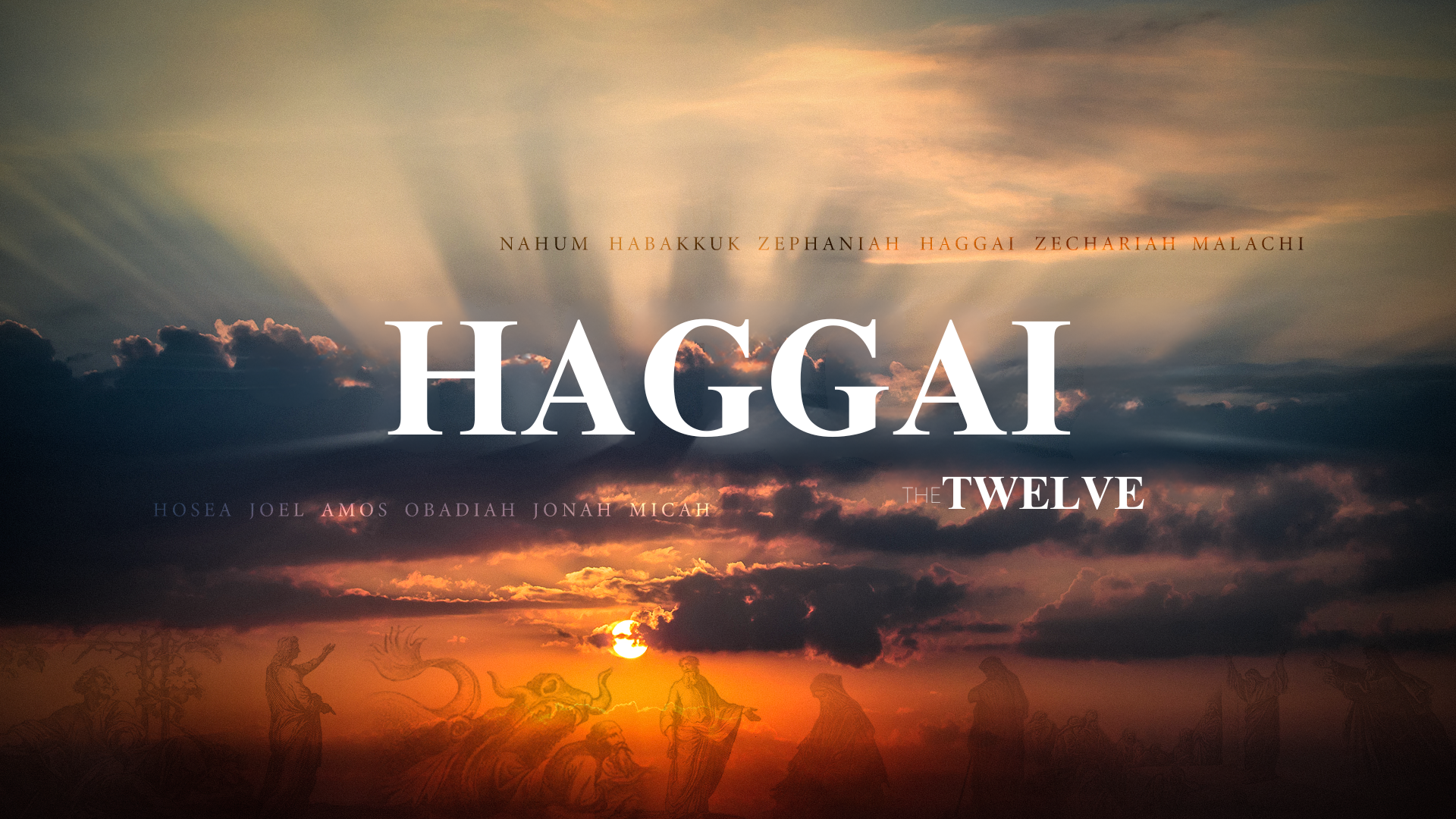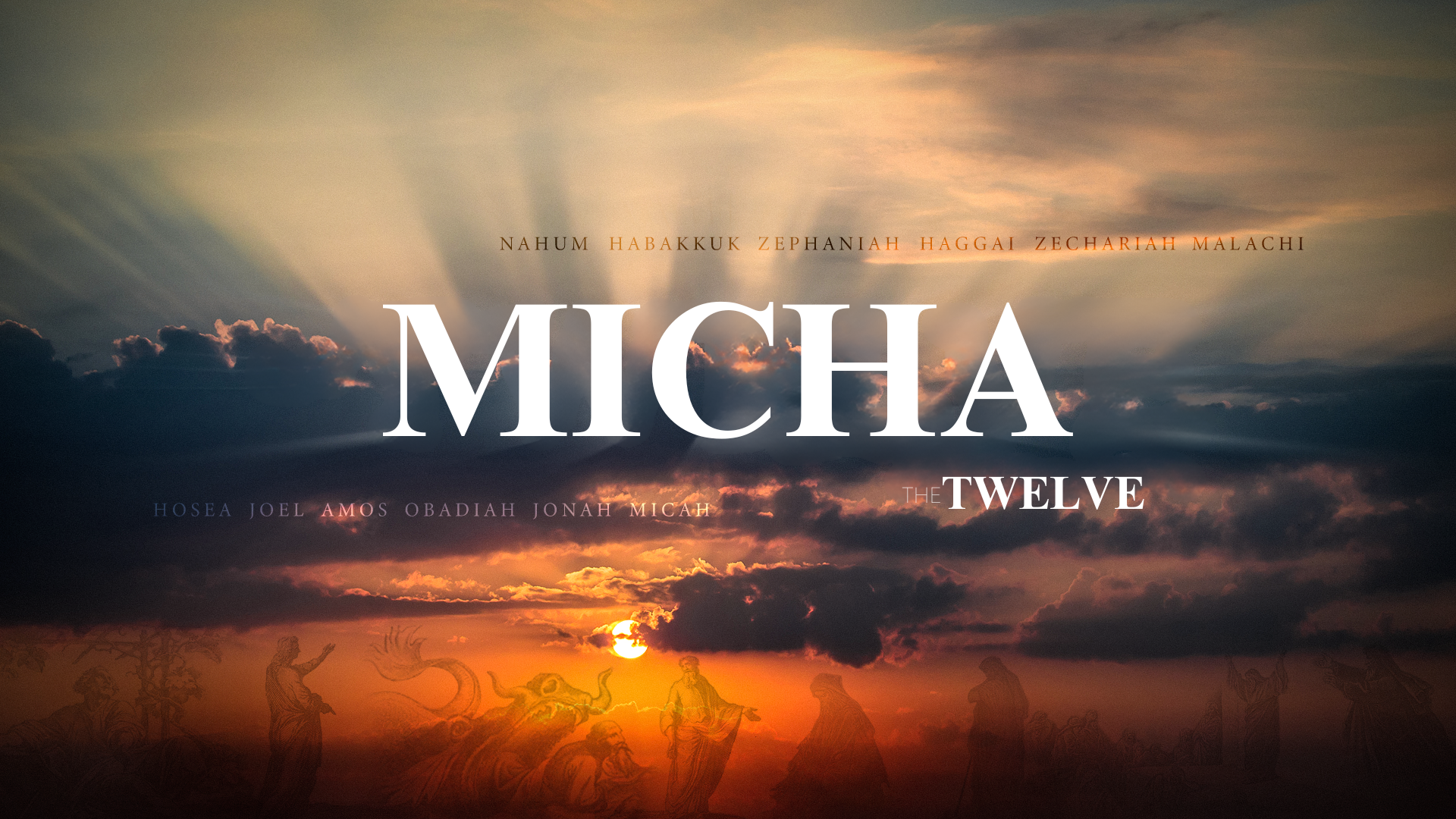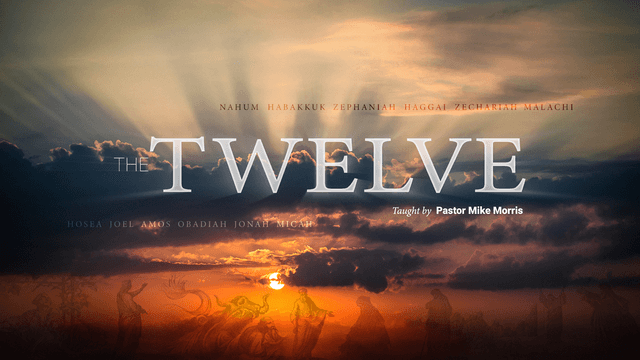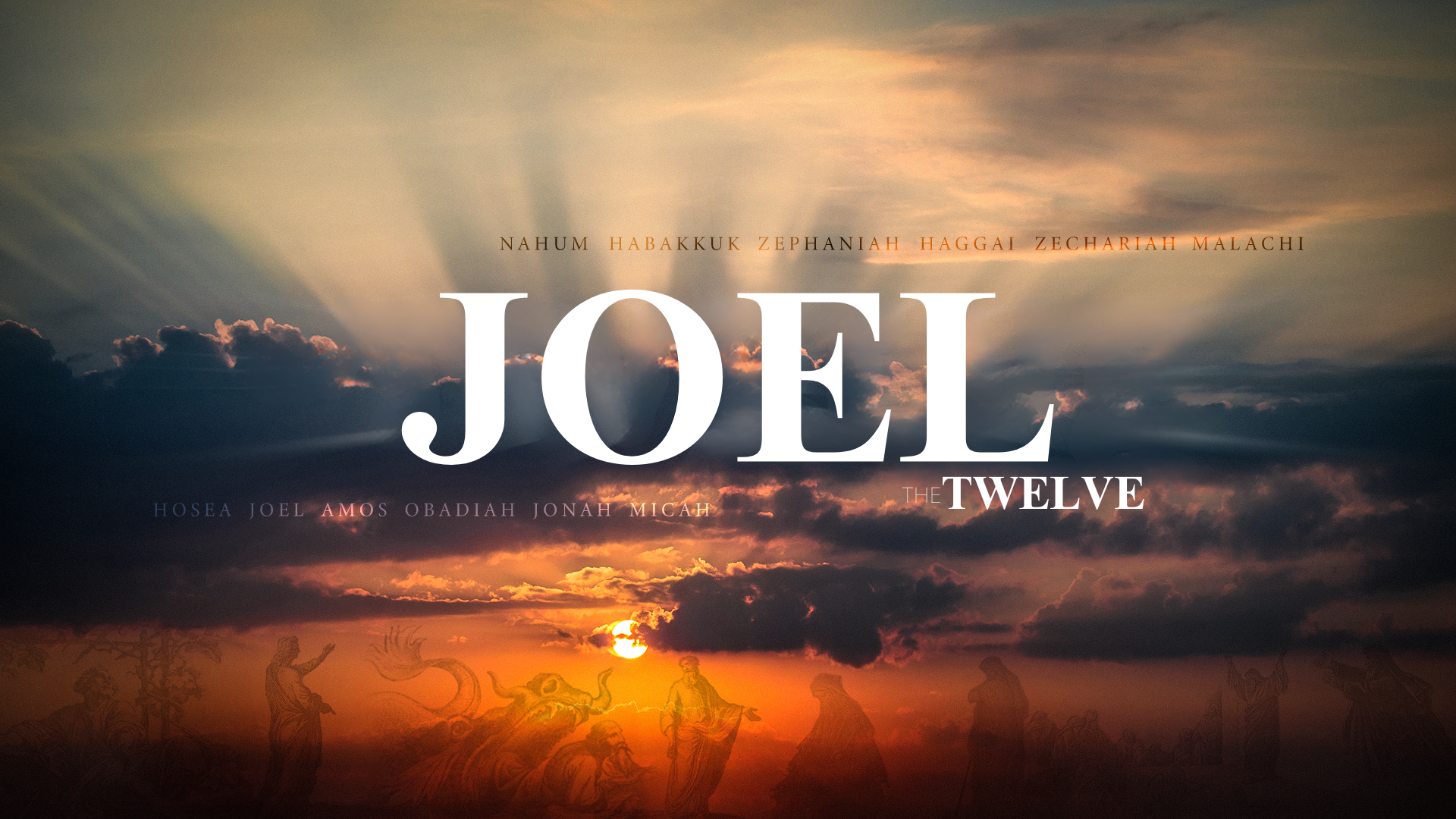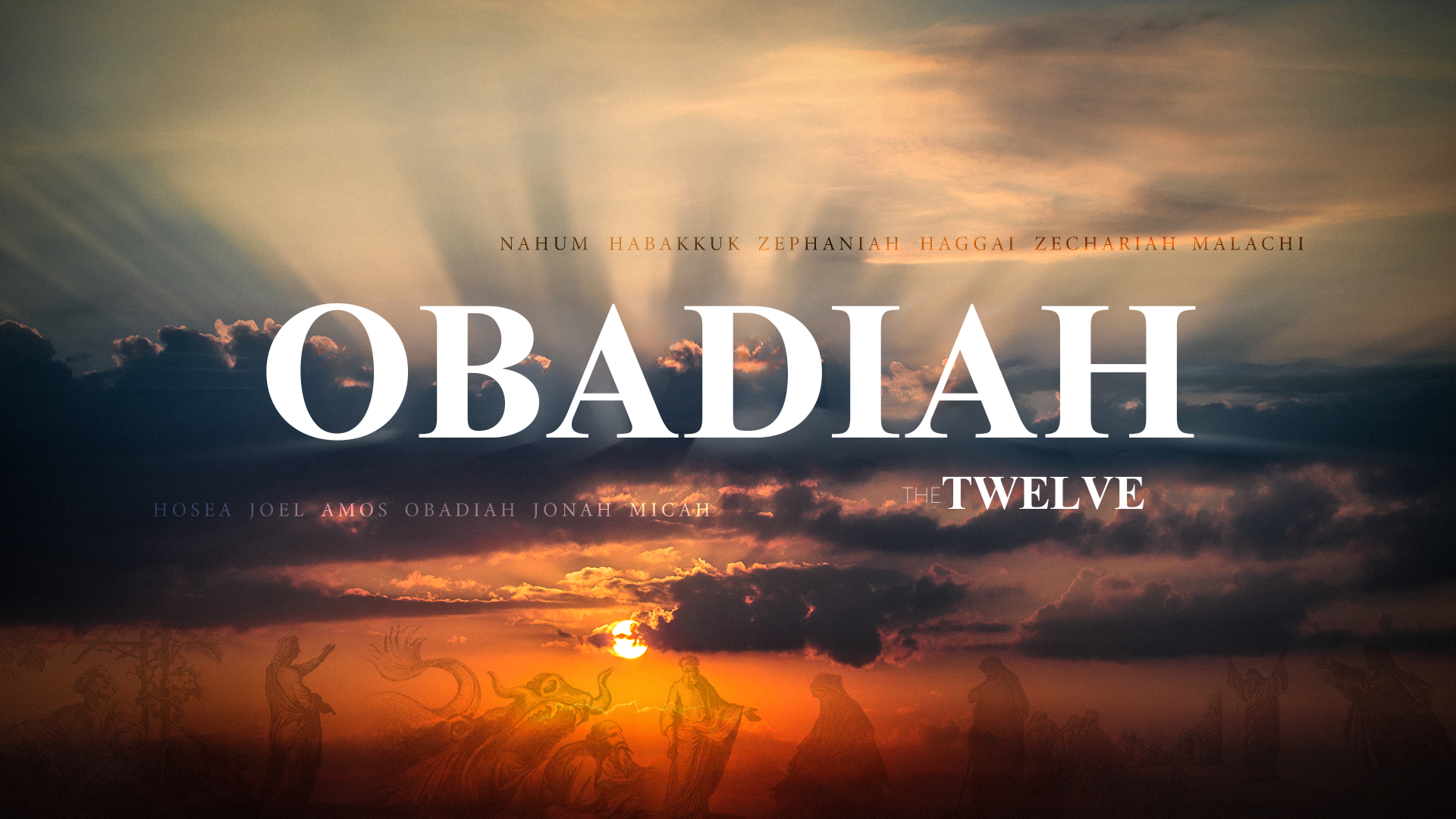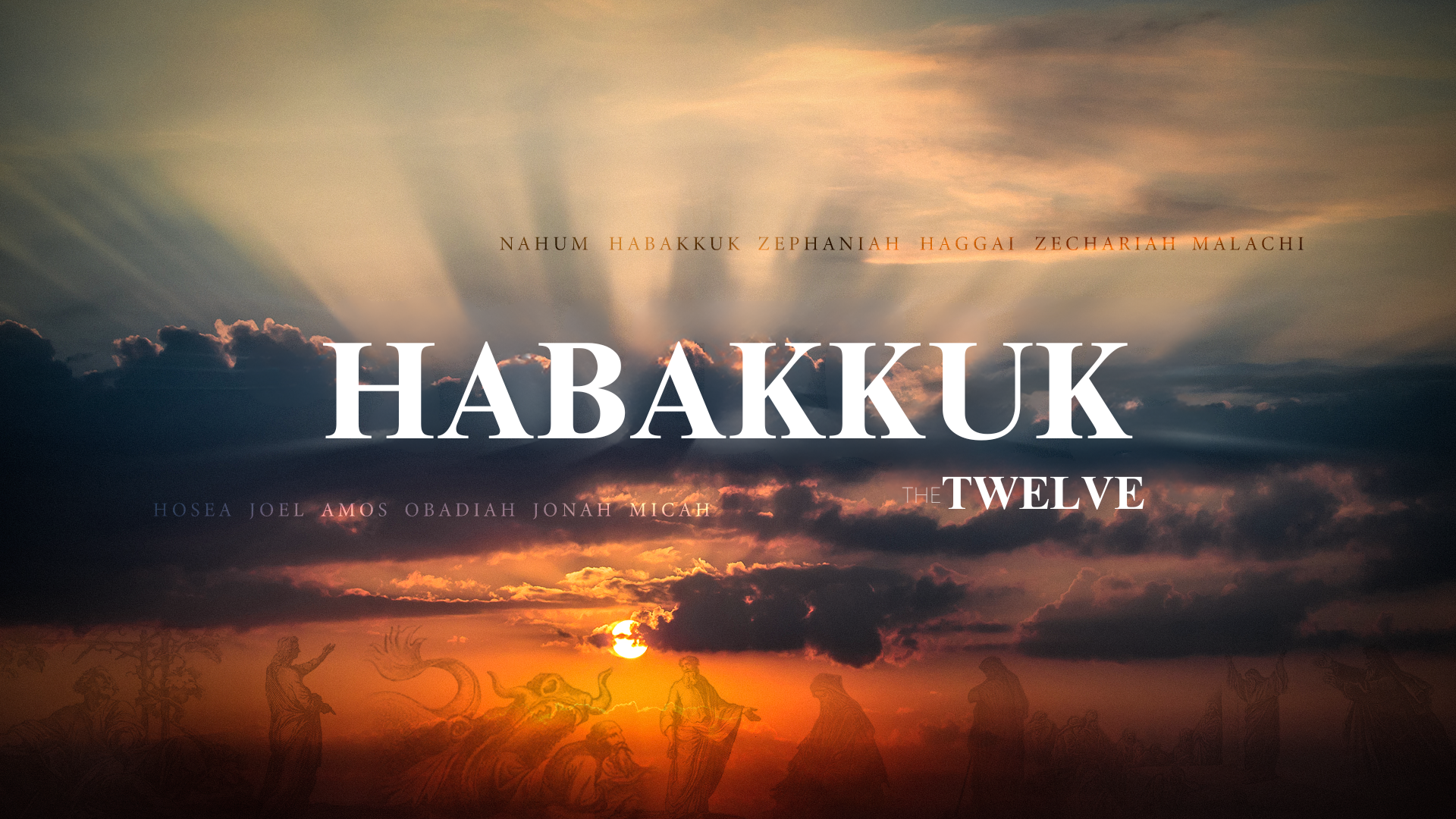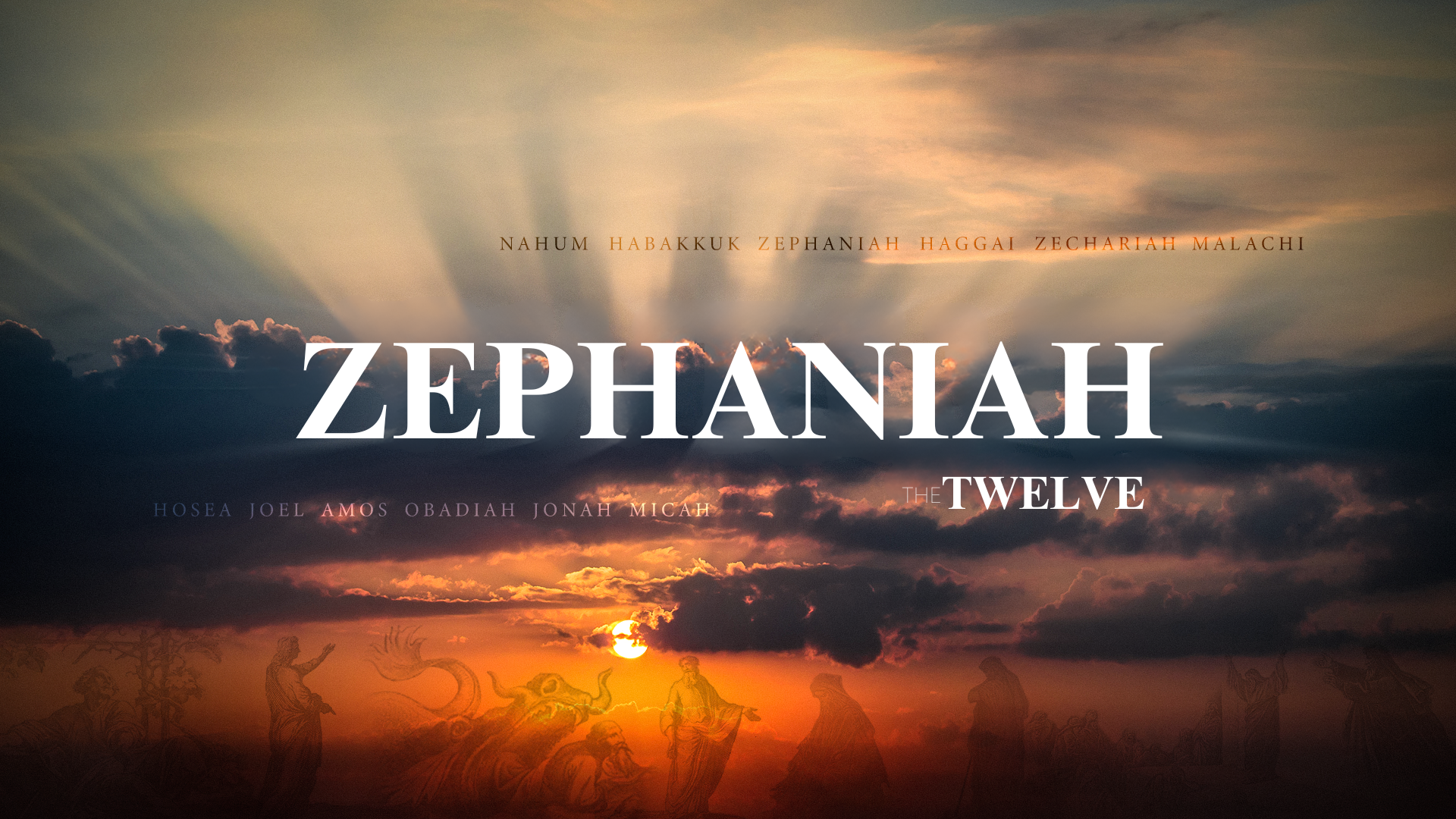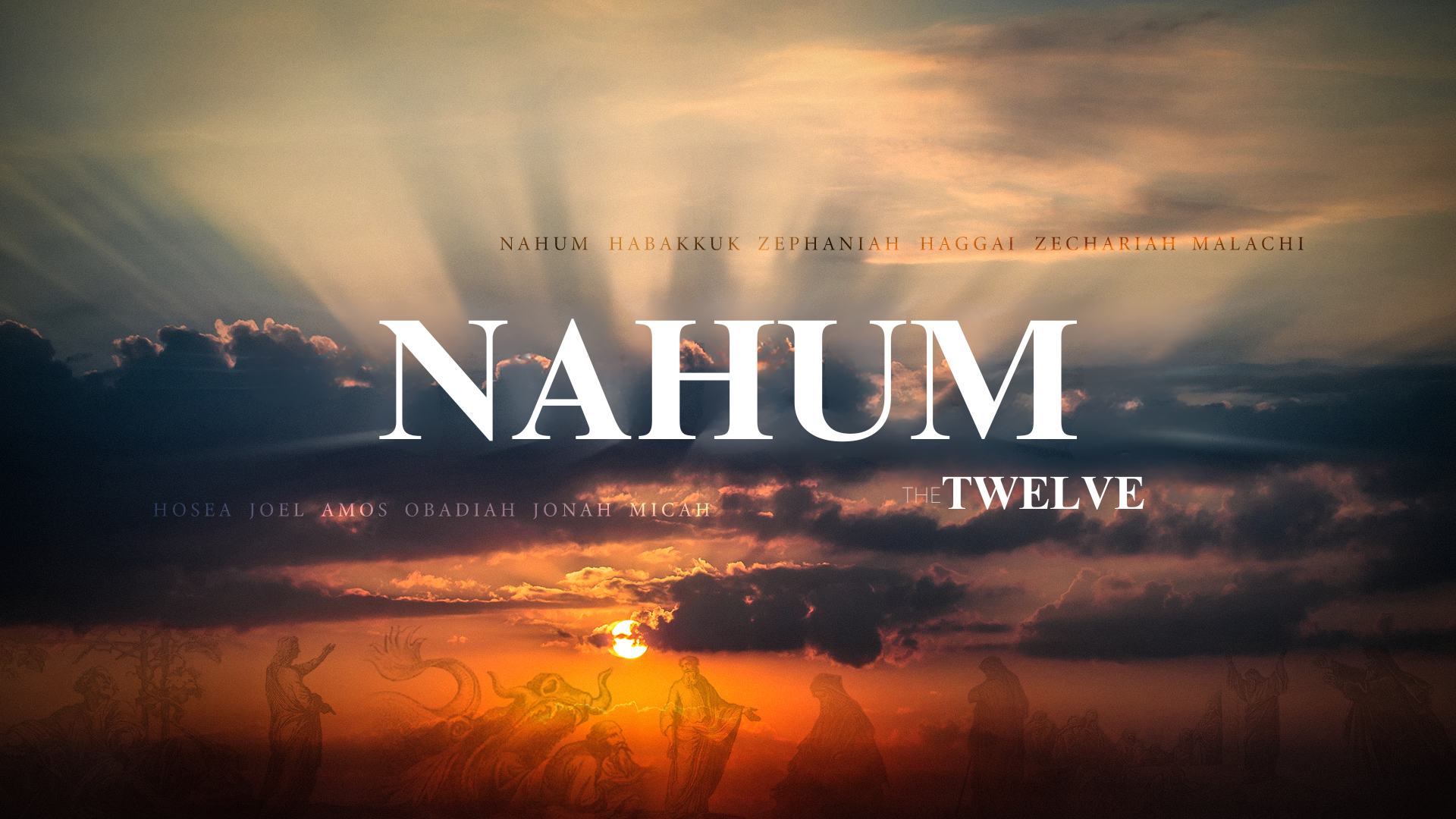MANUSCRIPT
Welcome back as we continue our study of The Twelve, the collection of prophetic books that closes the Old Testament…written by a wide variety of authors with important messages for the divided kingdoms of Israel and Judah in the period 930 to 430 BC
Let’s recall the context -- northern kingdom of Israel; 760 BC, just 20 years before the beginning of the deportation of Israel into exile in the farthest reaches of the Assyrian Empire, an exile from which national Israel would not return…
SLIDE 1 -- ISRAEL IN THE PERIOD OF THE TWELVE
Over the last two weeks we covered the book of Jonah, our first in this series of the Twelve, and the first prophet to the northern kingdom of Israel, from a chronological perspective...
As we carefully examine the prophets of the Old Testament, we notice there are two main divisions of prophets -- first, those whose stories are told in the narratives of the historical books of the OT...prophets like Elijah and Elisha and Samuel...their writings or sermons are not recorded, but instead their experiences are included in Scripture ...secondly, there are those whose prophecies were in the form of oracles of visions and were recorded...this group would include Ezekiel, Jeremiah, Daniel, and the Twelve, whose writings are included in the prophetic canon of the Old Testament
This week we turn to the next prophet in the order of the prophets to Israel -- Amos -- we find him on the timeline just to the right of Jonah, also serving during the almost forty-one year reign of Jeroboam II, 793 BC to 743 BC...this book will take a few weeks, due both to its length -- nine chapters -- and its content, which is a wide-ranging and comprehensive look at conditions in the northern kingdom and the surrounding nations as well
So let’s dive into the background of this significant book, the book of Amos...we’ll consider what we know about the setting, themes, date, author, location, and historical context...beginning with the opening two verses of chapter one...Amos 1.1-2
The words of Amos, who was among the shepherds of Tekoa, which he saw concerning Israel in the days of Uzziah king of Judah and in the days of Jeroboam the son of Joash, king of Israel, two years before the earthquake.
And he said:
“The Lord roars from Zion
and utters his voice from Jerusalem;
the pastures of the shepherds mourn,
and the top of Carmel withers.”
The voice of God is about to be heard again in the land, roaring from Zion and Jerusalem
The author is Amos himself, declared in the first verse...he is somewhat unusual among the prophets in that he wasn’t a “professional” prophet, not a prophet who made his living as a prophet nor was he one of the “sons of the prophets,” a guild of sorts that gathered around prophets, particularly in the time of Elijah and Elisha in the northern kingdom
Instead, Amos was what we would call a bivocational prophet...he describes himself as a shepherd, a “herdsman” (or a livestock breeder, a manager of herds), and a dresser of sycamore fig trees...someone we might today call an arborist, someone skilled at pruning and caring for sycamore fig trees to maximize their yield
Though he was not a professional prophet, he knew well the covenant history of Israel, and the characters and histories of the surrounding nations
There’s a lesson for us here -- God often calls into ministry those engaged in other lines of work or professions...that in no way diminishes vocational or professional ministers, but it does open up the door as God calls people to take on significant ministry responsibilities when they are not called into vocational work but instead remain serving elsewhere...in business, academia, government, wherever the Lord has them...ministry isn’t something that should be left to the professionals and seminary graduates...it’s for ALL the people of God...
Ephesians 4.11-12
11 And he gave the apostles, the prophets, the evangelists, the shepherds and teachers, 12 to equip the saints for the work of ministry, for building up the body of Christ,
Some are called to equip, but all are called to serve
Amos was from Tekoa, a small town in Judah, not Israel...let’s look at a map
Tekoa is about ten miles directly south of Jerusalem, and only 20 miles from the border of Israel and Judah; he was only a short distance from Bethel, an Israelite city right on the border, and the location of an idolatrous worship center for Israel, featuring a golden calf put there by Jeroboam I in 930 BC
Amos prophesied in approximately 760 BC, only twenty years before the beginning of the Assyrian exile, and just after Jonah’s experience in Nineveh; Assyrian power was rising in the north, a situation that challenged Jeroboam II’s successors, especially Hoshea; Israel rightly saw a resurgent Assyrian as a threat
The social, religious, and political conditions within Israel help us understand the book’s content...Israel was continuing their steady decline into full apostasy and rebellion against their covenant God...their sins were rampant and varied, but can be grouped into two groups: idolatry and social injustice within the community...we’ll see those sins highlighted as we progress through the book
The God of Israel was unforgiving of both the worship of false gods, and of unfair and unlawful treatment of others within the society...these violations of God’s Law led to the prophetic message of a covenant “lawsuit” -- this book takes that approach, along with others of the Twelve...the people are being called to account for their disobedience of the terms of the covenant and they will suffer the consequences of their sinful actions
We see the uncompromising nature of God’s judgment in chapters one and two, which begin with judgments against surrounding nations...we’ll consider them in order, but first, we need to see the formula of the pronouncement of the judgment (SLIDE)
Part one: the offender -- “for three transgressions of _____________ and for four, I will not revoke the punishment...”
Part two: the offense -- “...because _________________” (and the sins are listed)
Part three: the punishment -- “...so I will send a fire upon the wall of _____________ (significant city, often the capital) and it will devour her strongholds...” -- “fire” represents the destructive judgment
Let’s look more closely at the judgments to fall on the nations surrounding Israel
Amos 1.3-5: Damascus
Thus says the Lord:
“For three transgressions of Damascus,
and for four, I will not revoke the punishment,
because they have threshed Gilead
with threshing sledges of iron.
4 So I will send a fire upon the house of Hazael,
and it shall devour the strongholds of Ben-hadad.
5 I will break the gate-bar of Damascus,
and cut off the inhabitants from the Valley of Aven,
and him who holds the scepter from Beth-eden;
and the people of Syria shall go into exile to Kir,”
says the Lord.
SLIDE
Damascus was the capital city of the nation of Syria...still a prominent city in the NT as well, and even today...the destination of Saul of Tarsus as Jesus Christ drops him to his knees with a blinding light transforming him into the apostle Paul
What was their sin?
Cruelty against the people of Israel...during the reign of Jehoahaz, 814 to 798 BC, twenty years or so prior to Amos’s prophecy...II Kings 13.3-4 says
3 And the anger of the Lord was kindled against Israel, and he gave them continually into the hand of Hazael king of Syria and into the hand of Ben-hadad the son of Hazael. 4 Then Jehoahaz sought the favor of the Lord, and the Lord listened to him, for he saw the oppression of Israel, how the king of Syria oppressed them.
Verse 7 adds
7 For there was not left to Jehoahaz an army of more than fifty horsemen and ten chariots and ten thousand footmen, for the king of Syria had destroyed them and made them like the dust at threshing
Amos predicts the punishment of Syria, identified by the capital city, Damascus, for “threshing” Gilead...threshing was a common task in grain farming...after harvest, the next step was to separate the wheat from the chaff...one way to do that was to spread the grain on the threshing floor, a level place, often outdoors so the wind could help blow away the chaff, then one or two oxen would drag a threshing sledge back and forth over the grain...the sledge was a large, heavy piece of wood, with knives or pieces of flint or metal or sharp stones embedded into the underside of the wood
II Kings says Syria destroyed most of the army of Israel and in a particularly cruel way... Amos’s oracle accuses Syria of threshing Gilead as one would thresh grain, dragging a threshing sledge over them...figurative words, but a fitting picture of the cruelty of Hazael
What is their punishment?
They would be defeated and punished...to break the “gate-bar” of a city was to expose it to attack...the inhabitants of the Valley of Aven, which translates to “Valley of Wickedness,” to the north and west of Damascus, would be taken into exile with most of the rest of the nation, to Kir, a region to the northeast of Syria, that was the original home of the people of Syria...see Amos 9.7b
Amos 1.6-8: Gaza
Thus says the Lord:
“For three transgressions of Gaza,
and for four, I will not revoke the punishment,
because they carried into exile a whole people
to deliver them up to Edom.
7 So I will send a fire upon the wall of Gaza,
and it shall devour her strongholds.
8 I will cut off the inhabitants from Ashdod,
and him who holds the scepter from Ashkelon;
I will turn my hand against Ekron,
and the remnant of the Philistines shall perish,”
says the Lord God.
(SLIDE)
The nation of Philistia, home of the Philistines, is represented by one of it’s royal cities, Gaza...still of importance today in the Middle East, having given it’s name to the Gaza Strip, a Palestinian territory on the eastern coast of the Mediterranean, sharing a 32-mile border with modern-day Israel
What was their sin?
The text says they carried into exile a “whole people” -- likely Israelites from Judah during the reign of Jehoram, recorded in II Chronicles 21 -- then sold them into slavery in Edom, another nation to the southeast of Judah...we’ll see the Edomites in a moment
What was their punishment?
Four of the royal cities -- Gaza, Ashdod, Ashkelon, and Ekron -- will be “cut off” -- a term usually reserved for dying in battle...there was a fifth royal city of Philistia, Gath, but by this point it had already been destroyed by Assyria
Amos 1.9-10: Tyre
9 Thus says the Lord:
“For three transgressions of Tyre,
and for four, I will not revoke the punishment,
because they delivered up a whole people to Edom,
and did not remember the covenant of brotherhood.
10 So I will send a fire upon the wall of Tyre,
and it shall devour her strongholds.”
(SLIDE)
Tyre was one of two major cities of Phoenicia, Sidon being the other...they’re often mentioned together in Scripture
They had historically been allies of Israel under David and particularly Solomon, with treaties and friendly relations...I Kings 9 tells us that Hiram, king of Tyre, provided the cedar, cypress timber, and gold for many of Solomon’s building projects, in exchange for twenty cities; and that Hiram had provided crews to sail a fleet of ships Solomon built and stationed on the Red Sea
Apparently Tyre didn’t come to the aid of the Israelites when Philistia attacked Israel, taking the Israelites into slavery in Edom, violating the “covenant of brotherhood” in verse 10
What was their punishment?
Not stated exactly...only that God would judge the nation for their treachery...we do know the city was conquered by Alexander the Great in the fourth century BC
Amos 1.11-12: Edom
11 Thus says the Lord:
“For three transgressions of Edom,
and for four, I will not revoke the punishment,
because he pursued his brother with the sword
and cast off all pity,
and his anger tore perpetually,
and he kept his wrath forever.
12 So I will send a fire upon Teman,
and it shall devour the strongholds of Bozrah.”
(SLIDE)
Edom wasn’t a city, but a region...southeast of Judah, located due south of the Dead Sea
Known as the land of Esau, Jacob’s brother...Genesis 36.6-8
6 Then Esau took his wives, his sons, his daughters, and all the members of his household, his livestock, all his beasts, and all his property that he had acquired in the land of Canaan. He went into a land away from his brother Jacob. 7 For their possessions were too great for them to dwell together. The land of their sojournings could not support them because of their livestock. 8 So Esau settled in the hill country of Seir. (Esau is Edom.)
What was their sin?
Cruelty against their brother, Israel, followed by generations of hostility and conflict
Their territory was in the path of the Israelites as they departed Egypt in the Exodus, recorded in Numbers 20.14-21
14 Moses sent messengers from Kadesh to the king of Edom: “Thus says your brother Israel: You know all the hardship that we have met: 15 how our fathers went down to Egypt, and we lived in Egypt a long time. And the Egyptians dealt harshly with us and our fathers. 16 And when we cried to the Lord, he heard our voice and sent an angel and brought us out of Egypt. And here we are in Kadesh, a city on the edge of your territory. 17 Please let us pass through your land. We will not pass through field or vineyard, or drink water from a well. We will go along the King's Highway. We will not turn aside to the right hand or to the left until we have passed through your territory.” 18 But Edom said to him, “You shall not pass through, lest I come out with the sword against you.” 19 And the people of Israel said to him, “We will go up by the highway, and if we drink of your water, I and my livestock, then I will pay for it. Let me only pass through on foot, nothing more.” 20 But he said, “You shall not pass through.” And Edom came out against them with a large army and with a strong force. 21 Thus Edom refused to give Israel passage through his territory, so Israel turned away from him.
That cruelty, denying a reasonable request from desert travelers and even more so from their brothers, dating back to Jacob and Esau, earned them God’s judgment here in Amos
Though David conquered Edom for a time, they eventually revolted against Israel and reclaimed their independence...but there was a long history between the two nations, including an invasion of Judah during the reign of Jehoram, and plundering the king’s house, recorded in II Chronicles 21.16-17
What was their punishment?
Like Tyre, there are no specifics...only an assurance that God would hold the Edomites accountable for their heartless treatment of the Israelites as they departed Egypt and for the years of strife that followed...and by prophesying the destruction of the cities of Teman and Bozrah, from the far north to the far south, Amos clearly says the entire nation will be destroyed
Amos 1.13-15: Ammon
13 Thus says the Lord:
“For three transgressions of the Ammonites,
and for four, I will not revoke the punishment,
because they have ripped open pregnant women in Gilead,
that they might enlarge their border.
14 So I will kindle a fire in the wall of Rabbah,
and it shall devour her strongholds,
with shouting on the day of battle,
with a tempest in the day of the whirlwind;
15 and their king shall go into exile,
he and his princes together,”
says the Lord.
(SLIDE)
The Ammonites were near neighbors of the northern kingdom of Israel, and like the Edomites, were relatives of Israel, though more distant -- the Ammonites were descended from Ben-Ammi, Lot’s son by one of his daughters...Moab was descended from the other...that story is recorded in Genesis 19
Ammon was in conflict with Israel as far back as the times of the Judges...the tragic story of Jephthah took place after he led the defense of the people of Gilead against the Ammonites, found in Judges 10 and 11...and Ammon figures prominently in the shameful story of David and Bathsheba...David condemns Bathsheba’s husband, Uriah, one of David’s most capable warriors, to die while storming the walls of Rabbah, Ammon’s capital
What was their sin?
Like other nations, Ammon resorted to extraordinary cruelty in battle...in this case, adopting the Assyrian practice of slaughtering pregnant women, obvious non-combatants, as they fought with Israel in an effort to dominate the region of Gilead and, as the text says, “enlarge their borders”
What was their punishment?
Their “fire” of judgment was likely destruction in battle...noteworthy is the emphasis on the tempest and the whirlwind, suggesting a rapid, chaotic battle instead of a siege...eventually the region was conquered by the Assyrians, and their leaders taken into exile
Amos 2.1-3: Moab
Thus says the Lord:
“For three transgressions of Moab,
and for four, I will not revoke the punishment,
because he burned to lime
the bones of the king of Edom.
2 So I will send a fire upon Moab,
and it shall devour the strongholds of Kerioth,
and Moab shall die amid uproar,
amid shouting and the sound of the trumpet;
3 I will cut off the ruler from its midst,
and will kill all its princes with him,”
says the Lord.
(SLIDE)
Moab is the third of the Transjordanian states -- those east of the Jordan River -- who were often in conflict with Israel and Judah...their relationship goes back to the period of the Exodus and the Judges...the story of Balak and the prophet Balaam is set in Moab, as is the renewal of the covenant in Deuteronomy 29, but likely one of the most memorable mentions of Moab in the Old Testament is from the book of Ruth, as Elimelech and Naomi move from Bethlehem to Moab to escape a famine, and Ruth the Moabitess marries one of their sons, eventually returning to Israel and marrying Boaz, forming part of the genealogy of Jesus
What was their sin?
Desecration of the body of a king...burning the body of a king was considered a great dishonor in the ancient world...denying them a royal burial...this incident may well stem from a battle between Moab and the combined forces of Israel, Judah, and Edom, recorded in II Kings 3, and found in an ancient inscription on a stele called the Moabite Stone
What was their punishment?
Again, destruction in a wild and tumultuous battle...similar in some ways to the fate of Ammon, with particular mention made of the death of the king and the princes
Now comes the most shocking part of this judgment passage -- the inclusion of Judah and Israel right alongside the pagan kings and nations
Amos 2.4-5: Judah
4 Thus says the Lord:
“For three transgressions of Judah,
and for four, I will not revoke the punishment,
because they have rejected the law of the Lord,
and have not kept his statutes,
but their lies have led them astray,
those after which their fathers walked.
5 So I will send a fire upon Judah,
and it shall devour the strongholds of Jerusalem.”
(SLIDE)
We know the identity of the southern kingdom of Judah, but we don’t expect their inclusion here...but God is faithful to rebuke even the sin of His own people, as He does here
What was their sin?
While the sins of the nations were focused on cruelty in war, the sins of Judah were different...since they were in covenant relationship with the Lord, the oracle calls them to account for their violation of that covenant...they had rejected the law of the Lord, and had violated His statutes...they had turned away from their God, and followed the false gods of the nations...and they had been led in that apostasy by their own kings, beginning with Solomon, who took wives from the very nations upon whom Amos now pronounces the judgment of God, and who participated in their idolatrous worship
What was their punishment?
In the same formula as the pagan nations, Judah will suffer the fire of God, His righteous judgment and punishment for their sins...we learn later that this will involve destruction at the hands of the Babylonians, and exile away from the good land their God had given them
Now Amos turns to Israel, pronouncing a judgment in an extended passage more than three times the length of any other prophecy
Amos 2.6-16: Israel
6 Thus says the Lord:
“For three transgressions of Israel,
and for four, I will not revoke the punishment,
because they sell the righteous for silver,
and the needy for a pair of sandals—
7 those who trample the head of the poor into the dust of the earth
and turn aside the way of the afflicted;
a man and his father go in to the same girl,
so that my holy name is profaned;
8 they lay themselves down beside every altar
on garments taken in pledge,
and in the house of their God they drink
the wine of those who have been fined.
9 “Yet it was I who destroyed the Amorite before them,
whose height was like the height of the cedars
and who was as strong as the oaks;
I destroyed his fruit above
and his roots beneath.
10 Also it was I who brought you up out of the land of Egypt
and led you forty years in the wilderness,
to possess the land of the Amorite.
11 And I raised up some of your sons for prophets,
and some of your young men for Nazirites.
Is it not indeed so, O people of Israel?”
declares the Lord.
12 “But you made the Nazirites drink wine,
and commanded the prophets,
saying, ‘You shall not prophesy.’
13 “Behold, I will press you down in your place,
as a cart full of sheaves presses down.
14 Flight shall perish from the swift,
and the strong shall not retain his strength,
nor shall the mighty save his life;
15 he who handles the bow shall not stand,
and he who is swift of foot shall not save himself,
nor shall he who rides the horse save his life;
16 and he who is stout of heart among the mighty
shall flee away naked in that day,”
declares the Lord.
What were their sins? It’s a long list...
The oppression of the poor through deceitful and wicked business practices (v 6-7a)
Gross sexual immorality (v 7b)
Engaging in idolatrous cult sexual practices (laying themselves down beside every altar on garments taken in pledge, which the Law forbade to keep overnight (Ex 22) (v 8a)
Drinking and probably drunkenness in the house of the Lord, with wine bought with unjust fines and penalties levied on the poor (v 8b)
Taken together, these practices reveal a wicked and godless society with no regard for the covenant nor their fellow Israelites, but only for themselves and their false gods, the rich oppressing the poor for their pleasures and personal gain
God reminds them of His goodness to His people, recounting their deliverance from slavery in Egypt and their exodus journey to the Promised Land, where He displaced other nations like the Amorites so the Israelites could inhabit Canaan
And when God called out Nazirites and prophets from among the people, the Israelites discouraged and even prohibited them, making the Nazirites to drink wine, which they were not permitted to do, and telling the prophets not to prophesy
What was their punishment?
They would surely suffer the judgment of God...the Lord uses a very interesting phrase...He says “I will press you down like an overstuffed pickup truck...” -- so to speak...you will be so burdened with sin and iniquity that you won’t be able to run from the judgment that will come upon you...your strength, your speed, your military might, not even your courage will save you from the wrath of the Almighty in that day...He doesn’t give any details about exactly how that judgment would be visited upon Israel, but He promises that it will...and indeed it did, as Assyria besieged and destroyed Samaria in 722 BC, taking the Israelites into exile and ending the northern kingdom
What do we learn from the opening passages of this book?
The Lord God will discipline His people...He will not overlook their sin, but instead will hold them accountable for their violation of His covenant
Yet at the same time, the Lord will be gracious to His people...He will not destroy them entirely
We find these parallel truths in a single beautiful passage in Jeremiah 30.11 and 22...
For I am with you to save you,
declares the LORD;
I will make a full end of all the nations
among whom I scattered you,
but of you I will not make a full end.
I will discipline you in just measure,
and I will by no means leave you unpunished.
• And in verse 22, Jeremiah adds this encouraging word...
And you shall be my people,
and I will be your God.”
So take courage, church -- the same faithful God that supports and defends Israel will discipline and restore us as well...we shall be His people alongside covenant Israel, and He will be our God...nevertheless, let us repent now and turn from our sin as we serve Him in these days

Taught by Mike Morris
Associate Pastor of Verse By Verse Fellowship
The Twelve Series
